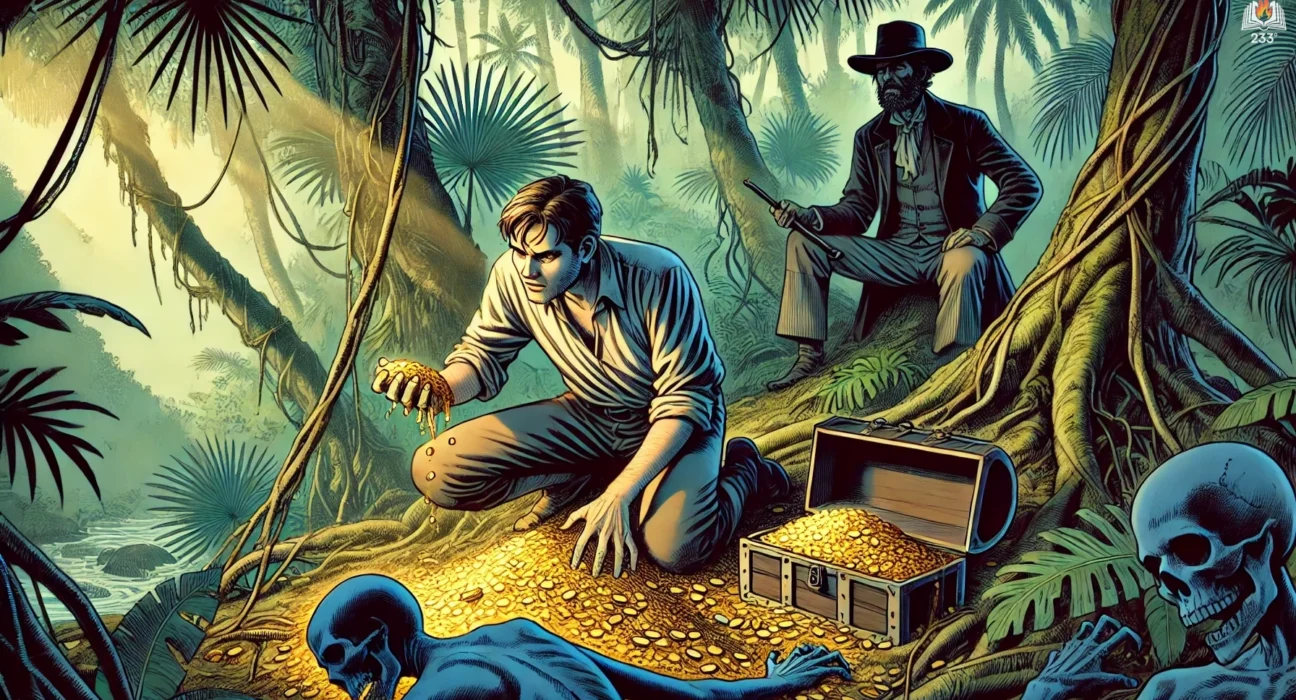“The Treasure in the Forest” by H.G. Wells, first published in 1894, is a suspenseful short story that combines elements of adventure and psychological horror. It follows two fortune seekers, Evans and Hooker, as they journey to a remote island in search of hidden treasure, only to find themselves ensnared by deadly traps and eerie forebodings. Wells, a master of speculative fiction, uses this narrative to delve into themes of greed, colonialism, and the dangers of trespassing into unknown realms.
Plot Summary
The canoe sliced through the still waters as the blazing sun beat down upon Evans and Hooker, weary treasure hunters nearing the fulfillment of their desperate quest. They drifted toward a gap in the reef where a faint ribbon of fresh water cut through dense jungle and spilled into the sea. Ahead lay an untouched island, thick with foliage and mystery, where the ancient treasure they sought was hidden. A map, worn thin from repeated folding, guided their journey. Its faded lines marked a path from the shore to the river, a winding route that promised riches but hinted, in its rough markings, at secrets lurking beneath the canopy.
Evans, weakened by thirst and exhaustion, glanced at Hooker. A single word escaped his parched lips, urging them forward. The treasure they had risked everything for lay tantalizingly close, yet both men felt a gnawing unease. Hooker, more cautious, studied the map one final time, tracing the dotted lines that led to a small star marking the treasure’s location. The faint scent of the jungle reached them, mingling with the oppressive heat and stoking their weariness. Their minds drifted, recalling the perilous journey that had brought them here, the fragments of a tale overheard from three shadowed figures who spoke of a legendary hoard buried by a shipwrecked crew centuries ago.
As they drew closer to the shore, Evans and Hooker could no longer ignore the exhaustion that weighed heavily upon them. In a single, urgent motion, they beached the canoe and set off into the forest, finding themselves in the grip of a landscape that swallowed them whole. The forest was alive, a place of towering trees and twisting vines, the ground dense with rotting leaves and roots that snaked like veins beneath their feet. Sunlight trickled down in shafts, casting an eerie glow that shifted with every step they took. It was as if the forest itself were watching, its silence interrupted only by the distant rush of the stream that would guide them to their prize.
Their progress was slow and laborious. Hooker, paddling furiously through the underbrush, urged Evans to keep pace, though the latter was flagging, barely able to suppress the gnawing thirst and weariness that dogged his every step. As they moved deeper into the forest, the heat softened, and a cool shadow enveloped them, bringing relief but also a sense of foreboding. Evans stumbled once, muttering under his breath, his gaze fixed on the glimmer of silver they occasionally caught glimpses of through the leaves. At long last, they reached the river’s edge and quenched their thirst, taking in the cool, fresh water in desperate gulps.
The momentary respite revived them, and they set off again with renewed vigor, following the map’s guideposts as it led them away from the river and into the thick of the forest. The underbrush gave way to a clearing marked by three towering palm trees, just as the map had shown, and the men’s hearts raced as they made out the faint outline of a shallow hole, partially filled with loose soil and scattered stones. Beside it lay a spade of unmistakably foreign make, its wooden handle splintered with age, while nearby, sprawled on the ground, lay the still, blue-clad figure of a man.
Hooker stepped back, and Evans followed his gaze to the prone body. Though decayed, the figure bore the unmistakable marks of death from something sinister; his swollen limbs and darkened skin suggested poison, or perhaps the touch of some otherworldly force lurking in the forest. Hooker’s face paled, but Evans, now nearly feverish with greed, saw only the glimmering bars in the half-dug hole. He reached down, grasping one of the dull, heavy ingots with trembling hands, barely noticing the small thorn that pricked his palm as he lifted it.
A chill passed between the two men, as if the forest itself recoiled at their presence. Hooker’s gaze returned to the corpse, an image that gnawed at his nerves, stirring memories of whispered warnings, half-forgotten fragments of the tale the Chinese men had shared. But greed outweighed caution. As they loaded their haul into a makeshift bundle of cloth, the shadow of Chang-hi, the man who had originally hidden the treasure, seemed to hang over them, his cunning protections now understood too late. Evans cursed the man’s cleverness and carried the cloth bundle, flinging it over his shoulder as they began the return journey.
Yet with every step they took, a strange fatigue began to settle over Evans, a heaviness in his limbs that sapped his strength and clouded his vision. Soon, his breathing grew labored, his arms trembling as if under some invisible weight. Hooker, too, began to feel the subtle onset of discomfort, a dull ache spreading up his hands and arms. Evans’ face grew pale and slick with sweat as he stumbled, his eyes wide with dawning realization. Hooker watched helplessly as his partner staggered and then collapsed, his hands clutching his throat in agony.
The air grew oppressive, thick with an unseen menace. Hooker’s mind raced, and a cold dread gripped him as he inspected the small pricks on Evans’ hands, a pattern of tiny punctures that mirrored those on his own skin. The thorns, seemingly harmless, now took on a deadly significance. He recalled with chilling clarity the peculiar marks on the map, and the eerie satisfaction in Chang-hi’s final grin. Hooker realized, too late, that the treasure had been guarded by poison, a deadly defense lying dormant for the unwary. The gold was indeed safe—as Chang-hi had promised.
Evans lay at Hooker’s feet, silent and still, his body twisted in pain and his face frozen in a grimace of horror. Hooker tried to steady himself, fighting the panic rising in his chest, but he could feel the poison’s grip tightening. His own hands had begun to numb, his limbs growing heavy and unresponsive. In desperation, he dropped to his knees and attempted to suck the poison from his wounds, but the numbness was spreading faster than he could counteract it.
The forest around him seemed to close in, shadows thickening as the life drained from his body. Hooker’s gaze fell upon the glint of gold scattered around him, and a final surge of rage and despair filled his fading consciousness. He had been within reach of the very wealth that had driven him to this place, but he was bound to die alone in the same unforgiving wilderness. The soft rustle of leaves was the only answer to his fading cries, the once-glimmering prize now tainted with death and silence.
As his vision blurred, Hooker’s last sight was of the golden ingots, lying untouched on the forest floor beneath the pall of the trees. Above him, the faint movement of leaves whispered through the canopy, and a single petal drifted down, settling upon the gold before his eyes closed for the last time. The treasure lay waiting, hidden beneath the green canopy, safe once more, just as Chang-hi had intended.
Main Characters
- Evans: A desperate and somewhat impulsive treasure hunter, Evans is driven by the allure of wealth but is physically and mentally worn by the harsh conditions of their expedition. His fixation on the treasure blinds him to the dangers, ultimately leading him to his demise.
- Hooker: Evans’ more cautious partner, Hooker is practical and wary, but equally motivated by greed. He initially resists rushing into action, sensing danger in their surroundings, though he eventually falls victim to the same fate as Evans due to his own avarice.
- Chang-hi: Though deceased before the story begins, Chang-hi is the original owner of the treasure and a Chinese sailor who, after discovering the treasure, safeguarded it with deadly traps. His hidden malice and cunning are embodied in his poison-laden precautions, making him a ghostly adversary in the story.
Theme
- Greed and its Consequences: The story portrays how greed blinds individuals to the dangers around them. Evans and Hooker’s unquenchable thirst for gold drives them into a deadly trap, underscoring the high costs of avarice.
- Colonialism and Trespassing: The two protagonists’ sense of entitlement in taking treasure that does not belong to them mirrors colonial attitudes of exploitation. Their journey into foreign territory without understanding its dangers reflects the disregard for indigenous knowledge and respect for boundaries.
- The Unseen Dangers of the Natural World: Wells uses the forest as a metaphor for the unknown, with deadly plants, traps, and a hostile environment underscoring the perils of venturing unprepared into unfamiliar terrains.
Writing Style and Tone
Wells’ writing style in “The Treasure in the Forest” is rich with vivid descriptions that enhance the tense atmosphere and build a slow, creeping sense of dread. His detailed rendering of the environment—from the glaring sun to the cool shadows within the forest—creates an immersive setting that feels both alluring and dangerous. Wells masterfully interlaces foreboding details within natural imagery, transforming the idyllic landscape into a treacherous, almost malevolent character of its own.
The tone of the story is ominous and suspenseful, layered with an underlying critique of human nature. Wells uses restrained narration to build psychological tension, allowing the reader to sense the growing dread before the characters themselves realize the danger they are in. The style reflects Wells’ skill in blending horror with subtle moral commentary, leaving readers to ponder the true price of unchecked ambition.
We hope this summary has sparked your interest and would appreciate you following Celsius 233 on social media:
There’s a treasure trove of other fascinating book summaries waiting for you. Check out our collection of stories that inspire, thrill, and provoke thought, just like this one by checking out the Book Shelf or the Library
Remember, while our summaries capture the essence, they can never replace the full experience of reading the book. If this summary intrigued you, consider diving into the complete story – buy the book and immerse yourself in the author’s original work.
If you want to request a book summary, click here.
When Saurabh is not working/watching football/reading books/traveling, you can reach him via Twitter/X, LinkedIn, or Threads
Restart reading!








